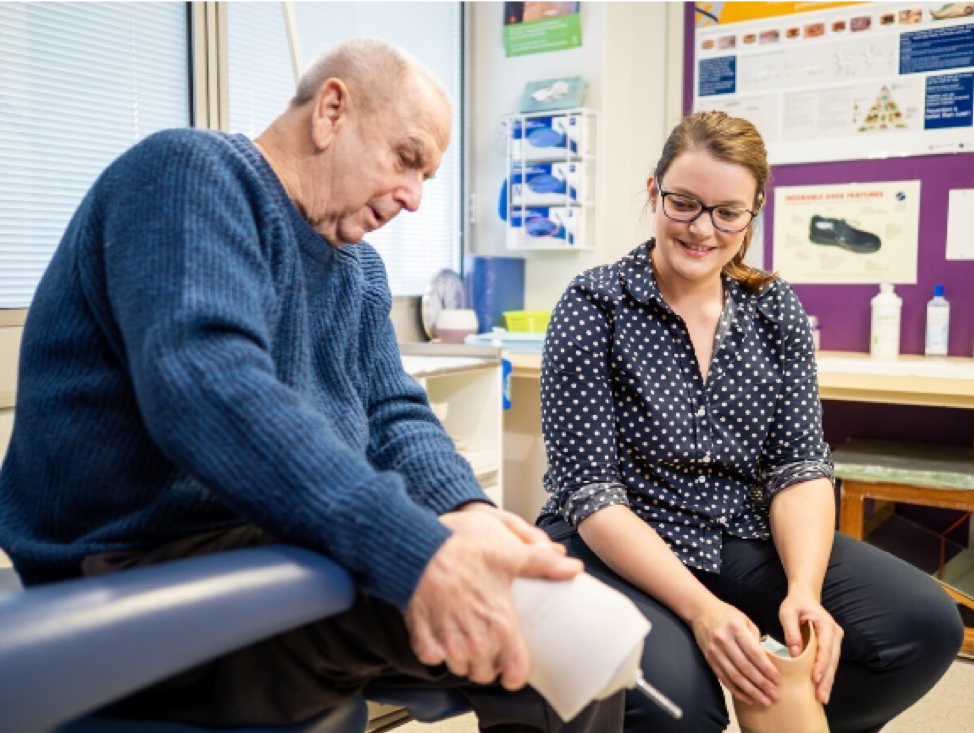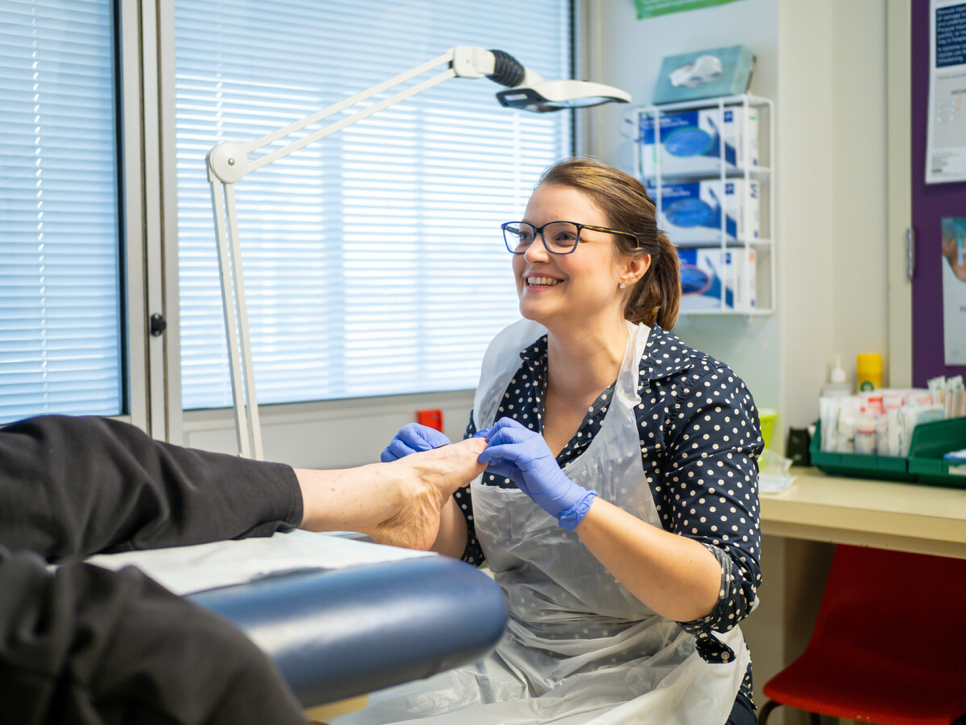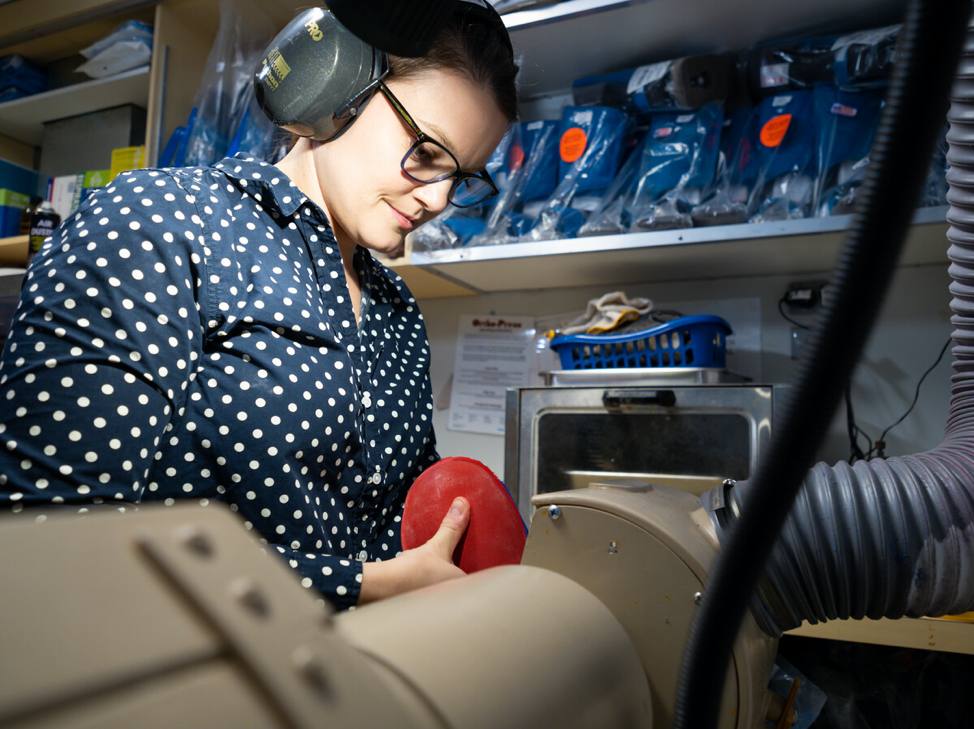- connecting our global network
29 January 2021
Steps to a Rewarding Career in High-Risk Podiatry

Ereena Torpey
Senior Podiatrist at Flinders Medical Centre
Bachelor of Podiatry
Graduate Certificate of Health Sciences (Podiatry)
After graduating from the University of South Australia in 2007, Ereena Torpey has worked fulltime in the podiatry field ever since – first in country Victoria, then Tasmania, and has now come home to Adelaide as a Senior Podiatrist in the high-risk sphere.
As both Ereena’s parents are nurses, she had no doubt she wanted to follow a career into the health field, and podiatry managed to check many of her boxes.
For Ereena it’s been an incredibly fulfilling career path where no two days are the same and she’s been able to really make an impact to an individual – drastically improving their quality of life.
Plus, there’s always a challenging, problem-solving aspect to the work she loves as it requires a very supportive environment in which all staff are encouraged to do their best, be open to change and innovation, and keen to provide the best practice possible.
“Podiatry is a really diverse and wide-ranging profession so you can do anything from paediatrics through to sport and biomechanics, and aged career facilities.”
“I’ve always wanted to go into high-risk podiatry, particularly after my placement, as I think it’s an opportunity to make the most impact and give the most back to patients.”
“To see someone that the doctors have talked about amputating their foot or amputating a toe and be able to make a difference, and potentially delaying or preventing that, is really amazing.”

During day three of Ereena's placement she was completing as a part of the Bachelor of Podiatry, her external supervisor broke her hand – and with limited staff members that week at this practice – Ereena was truly thrown into the deep end. As a result, it was a steep learning curve, but she deeply enjoyed it, and the experience set her on a successful career trajectory.
This was her first taste of high-risk podiatry, and she was able to get a real sense of being a working podiatrist, being able to put all the remaining pieces of her knowledge and theory she had learnt during study at UniSA's City East Campus into practice.
“For me, my placement was vital. It gave me the opportunity to learn specialisation on the job and I realised high-risk podiatry was the direction I wanted my career to go.”
“Most importantly, I definitely feel like I changed and grew as a person – both personally and professionally.”
Working in Flinders Medical Centre’s Podiatry High Risk Foot Clinic, Ereena is a key part of the team that provides comprehensive and complex management to individuals with current foot wounds and injuries.
She encounters everything from active foot wound, peripheral arterial disease and diabetes, infections, peripheral neuropathy, active charcot foot management, and amputations.
Working primarily alongside the vascular team – you’ll usually find her working with patients who are at risk of limb loss due to their wounds (mainly from Diabetes and circulation problems). Together with the multidisciplinary team, Ereena can help delay or prevent the amputation of patient’s toes or feet, seeing them improve their quality of life, which she says is rewarding.

Their work greatly benefits the community as they enable patients to get back to work when their wounds are healed, prevent hospital admissions and amputations, improve quality of life, reduce pain, increase independence and mobility, getting patients back on their feet – and in safe appropriate footwear.
“The podiatry profession is very fulfilling with varied career opportunities and no two days on the job being the same. I always wanted to work in high risk podiatry, with patients at risk of limb loss due to wounds from conditions like Diabetes or circulation issues.”
“Getting a good clinical outcome for a patient, may not always be wound healing, but enabling someone to get on with their life is very rewarding.”
“Telling patients that they are able to have a shower after possibly years of using bags to cover their foot wounds – I feel lucky to enable a patient to do such a basic human task that impact’s their life positively.”
“Patients that we thought we couldn’t help five years ago, now are back doing what they want to be doing, playing with their children and grandchildren – and not seeing us – which is lovely.”
An unstoppable career in health begins at UniSA. Discover 20+ health qualifications including physiotherapy, occupational therapy, speech pathology, podiatry, clinical exercise physiology, pharmacy, medical radiation sciences and more, and graduate career-ready with UniSA.



